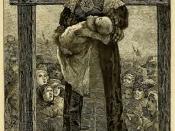Do people confess to a sin even if they might be punished for it? This is the question plaguing Arthur Dimmesdale. He cannot tell anybody about his sin because he is too weak. He thinks that if he tells the Puritans that he is Hester's lover they will all start treating him like an outcast and that terrifies him. Because of this weakness, Dimmesdale thinks of ways to make himself feel better. He first tries to get Hester to tell the Puritans, but that does not work. Then he starts mutilating himself, and in the end he just collapses and gives up. In the novel, The Scarlet Letter, by Nathaniel Hawthorne, Arthur Dimmesdale loses and suffers the most because he is too weak to confess his sin and to be looked down upon.
Dimmesdale is too weak to confess his sins and therefore he misses out on some of the best parts of life.
As Dimmesdale is in the forest talking to Hester, Hawthorne writes, "He sank down on to the ground, and buried his face in his hands"(169). The image of Dimmesdale sinking into the ground shows that he is not physically strong enough to hold himself up. This image suggests that Dimmesdale is moving closer towards evil and away from society, because the ground is close to hell, and hell is where people suffer the most. While Dimmesdale is falling to the ground he buries his face in his hands. Burying one's face in one's hands is a sign of weakness. Dimmesdale cannot show his face after what he has done, and this action shows his suffering. He cannot tell people what he did and feels shameful because of it. Dimmesdale's suffering is a simple case of cause and effect. If Dimmesdale had not been so weak as to be ashamed of his past, his current condition would not be so horrible.
Dimmesdale wants to tell the Puritans that he is Hester's lover, but he is too scared. He is so weak that he tries to get Hester to tell them for him but she will not. Dimmesdale says: "I charge thee to speak out the name of the fellow-sinner and fellow-sufferer! Be not silent"æ Hester, though he were to step down from a high place and stand beside thee, on a pedestal of shame"æ" (62). Dimmesdale is already feeling the pain of his mistake. If he did not feel bad about the sin he committed, he would not want Hester to tell the Puritans of his wrong doings. He wants Hester to tell the Puritans that he was the "fellow-sinner and fellow-sufferer" so he will not have to suffer alone. Dimmesdale knows that not telling the Puritans is wrong and it will cost him in the end, but he is weak. If he were stronger, then he could have told the Puritans himself. Because Hester does not tell the Puritans Dimmesdale was her lover, he ends up suffering even more than he would have had the news come out when Hester was still on the scaffold, because not telling anyone just prolonged his suffering. When Dimmesdale talks about "a pedestal of shame" he is trying to show how horrible the sin Hester and her "fellow-sinner" committed that everyone should get to scold them for it. A pedestal is a high platform that is usually used to honor people. When an Olympian wins a metal they are placed on a pedestal. The image of a "pedestal of shame" is ironic. This is because people on pedestals are looked up to but a person on a "pedestal of shame" would be looked down upon in the figurative sense. Because Dimmesdale does not want his sin to be looked down, upon he creates "a pedestal of shame" so he can decrease his suffering. Dimmesdale chooses the words "pedestal of stage" to make the crowd feel that they should look up to the sinners than look down at them. By creating a pedestal for his shame, his secret sin can be looked at in a better light. If Dimmesdale were not so weak, he wouldn't need the pedestal, and he could have told the Puritans himself and spared his life .
Dimmesdale thinks the best way to stop his suffering on the inside is to suffer on the outside as well. He decides that the best way to do this is to become a masochist: "In Mr. Dimmesdale's secret closet, under lock and key, there was a bloody scourge"æ to purify the body"æ"(pg. 126) Dimmesdale feels so bad that he thinks the only way to alleviate his suffering on the inside is to cause harm to himself on the outside. The reason that the scourge was "under lock and key" was so nobody else would know what he is doing because he is ashamed of himself. A "scourge" is "a whip or Any means of inflicting severe punishment." The image of a bloody scourge hidden in Dimmesdale's "secret closet" shows how Dimmesdale is suffering on the outside as well as on the inside. The image of a "secret closet" is disturbing because people put things in their closets that they do not want anyone else to see. The closet, being a secret, shows that Dimmesdale really does not want to anyone to know about his "scourge." If Dimmesdale were not so weak, he could tell the Puritans about his sin and without feeling like he must cause bodily harm to himself and hide it. Although it takes strength for Dimmesdale to whip himself, it would take more strength to tell the Puritans and suffer their consequences. Dimmesdale wants to purify his body to get rid of his suffering. Dimmesdale is desperate to get rid of his sin, so he has been led to believe that if he beats himself hard enough it will purify him and stop his suffering.
Dimmesdale is so weak by the end of the book that he feels he must tell the Puritans his sin because he is about to die and must repent for his sins. Soon after Dimmesdale tells the Puritans his sins, he dies. Dying after he tells the Puritans his sins shows how weak he really was, since telling the Puritans took all of the energy in his body. Dimmesdale felt that the only way for him to get to heaven when he died was to repent for all his sins, and that is what he did. Many people do crazy things before they die so they can go to heaven. I think that Dimmesdale does not realize that no one can be perfect, so he unsuccessfully tries to repent for his sins.





